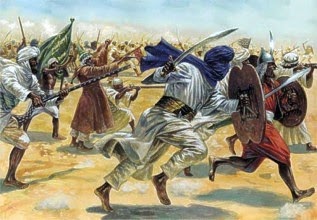Fahrenheit 451 by Irfan Husain
THAT’S the temperature at which paper auto-ignites, and is also the title of Ray Bradbury’s dystopian novel about a future America where books are burned by the state.
However, I doubt if the story inspired this generation of jihadis to go on their book-burning spree as nobody has accused these semi-literate barbarians of being fans of modern fiction. Quite the contrary: to show their devotion to culture, the warriors of the Islamic State recently blew up the Mosul Public Library that contained, among other volumes, 8,000 old manuscripts.
And lest anybody should think this act was an aberration, they also torched Mosul University’s main library, destroying thousands of books and precious manuscripts and documents. No wonder Unesco condemned these acts as “cultural cleansing”, and “one of the most devastating acts of destruction of library collections in human history”.
What is it about books that infuriates extremists?
Perhaps IS is trying to rival the depredations of their fellow jihadists in Mali who destroyed hundreds of 15th century Arabic manuscripts and ancient shrines in Timbuktu two years ago. They, too, considered it their religious duty to prevent knowledge from spreading.
Nigeria’s Boko Haram, of course, has placed its hatred of learning at the forefront of its agenda. Over the years it has destroyed scores of schools, and slaughtered teachers and students without mercy. And to further reaffirm their zeal, they have kidnapped hundreds of schoolgirls.
In Afghanistan, the Taliban have forbidden girls from going to school on pain of death. When they were in power, this edict was enforced at gunpoint; should the Taliban return to Kabul, girls will once more be deprived of an education. These stone-age zealots further displayed their piety and their respect for culture by dynamiting the giant carvings of Buddha in Bamiyan in 2001.
Not to be outdone, the Pakistani Taliban and their offshoots have blown up hundreds of schools. The attempted murder of Malala Yousafzai was only one incident in a campaign to prevent young children from acquiring an education. And, again emulating their Afghan cousins, they have destroyed many ancient Buddhist rock carvings across the northern region.
So what is it about books, learning and culture that infuriates these zealots? Clearly, they are all too aware of their own ignorance, and so lash out against symbols of knowledge and civilisation out of an acute sense of inferiority. But equally, they want to erase the history and culture society is founded upon in order to supplant them with their own version.
Predictably, this is a depressingly monochromatic, joyless worldview where all colour, music and fun are banished. No love, compassion or laughter is permitted, and faith has been reduced to a list of what is permitted and what is not. It goes without saying that the latter far exceed the former. Penalties start and end with death, with different forms of execution the only discretion judges have.
In this barren moonscape, justice is arbitrary and largely pro forma. Any teenager with a gun has the right to execute anybody he thinks is guilty of any one of the many crimes punishable by death. Fatwas come thick and fast, ranging from one against making snowmen to another against yoga.
Another thing jihadists across the Muslim world — as well as their acolytes in the diaspora — have in common is their hatred for anybody who does not share their perverted belief system. First and foremost are Christians, usually conflated with the Crusaders. How poor Assyrian villagers in Syria, or Egyptian Copts, or Punjabi Christians can be equated with European Crusaders from 1,000 years ago is beyond me. But no doubt fevered minds, uncluttered by the demands of logic, have worked out some linkage.
Of course, the weak and the vulnerable are easy targets for these brave warriors as they seek to impose their caliphate on a distinctly reluctant Muslim world. After all, it is much easier to shoot 142 children in cold blood in a school in Peshawar than take on the regular army. And blowing up a library in Mosul is a simple task when compared with taking on the Kurdish peshmerga forces.
Such violent acts against innocent people and symbols of learning also serve to reinforce the sense of power and invincibility these jihadists seek to project. As we have seen, videos of brutal killings have served as potent recruitment tools. Clearly, they strike a chord in simple-minded, impressionable youngsters.
And while these killers rampage across large swathes of the Muslim world, we keep repeating ‘Islam is a religion of peace’. The problem, however, is not so much with Islam as it is with many Muslims. All sacred texts contain passages which, if cherry-picked, can seem to justify violence. But currently, it is mostly misled Muslims who are killing in the name of religion.
What is lacking in all these ‘peaceful’ Muslims is anger and a sense of outrage at what’s being done in their name.




Comments
Post a Comment